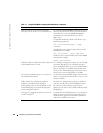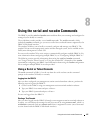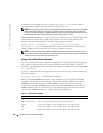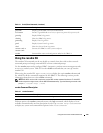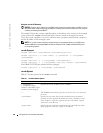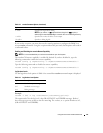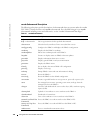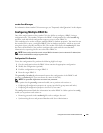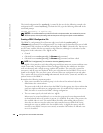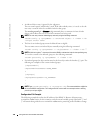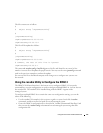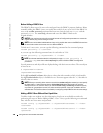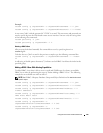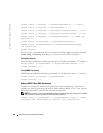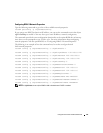
134 Using the serial and racadm Commands
www.dell.com | support.dell.com
The initial configuration file, racadm.cfg, is named by the user. In the following example, the
configuration file is named myfile.cfg. To obtain this file, type the following command at the
command prompt:
racadm getconfig -f myfile.cfg
NOTICE: It is recommended that you edit this file with a simple text editor; the racadm utility uses an
ASCII text parser, and any formatting confuses the parser and might corrupt the racadm database.
Creating a DRAC 4 Configuration File
The DRAC 4 configuration file <filename>.cfg is used with the racadm config -f
<filename>.cfg command. The configuration file is a simple text file that allows the user to build
a configuration file (similar to an .ini file) and configure the DRAC 4 from this file. You may use
any file name, and the file does not require a .cfg extension (although it is referred to by that
designation in this subsection). The .cfg file can be:
•Created
• Obtained from a
racadm getconfig
-
f
<filename>
.cfg
command
• Obtained from a
racadm getconfig
-
f
<filename>
.cfg
command, and then edited
NOTE: See "config/getconfig" for information about the getconfig command.
The .cfg file is first parsed to verify that valid group and object names are present and that some
simple syntax rules are being followed. Errors are flagged with the line number in which the
error was detected, and a simple message explains the problem. The entire file is parsed for
correctness, and all errors are displayed. Writes are not performed to the DRAC 4 if an error is
found in the .cfg file. The user must correct all errors before any configuration can take place.
The
-c option may be used in the config subcommand, which verifies syntax only and does not
perform writes to the DRAC 4.
Remember the following important points:
• If the parser encounters an indexed group, it is the value of the anchored object that
differentiates the various indexes.
The parser reads in all of the indexes from the DRAC 4 for that group. Any objects within that
group are simple modifications at configuration time. If a modified object represents a new
index, the index is created on the DRAC 4 during configuration.
• The user cannot specify a desired index in a
.cfg
file.
Indexes may be created and deleted, so over time the group may become fragmented with
used and unused indexes. If an index is present, it is modified. If an index is not present, the
first available index is used. This method allows flexibility when adding indexed entries,
where the user does not need to make exact index matches between all the RACs being
managed; new users are added to the first available index. A
.cfg
file that parses and runs
correctly on one DRAC 4 may not run correctly on another if all indexes are full and a new
user is to be added.



